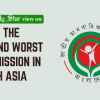The case for freedom of expression

The recent gruesome killings and attack of young bloggers, and the murder of a publisher by unknown assailants last year, allegedly recruits of religious extremists, fanatics and bigots, had shocked and angered the nation. These attacks and murders are a blatant attack on free thinking, free expression and on democracy itself and call for stern action by law enforcing agencies to apprehend and bring the assailants to justice and to root out the operating hideouts of the perpetrators.
It is intriguing to see bloggers being targeted by the extremists. I myself have never read any material of the bloggers but I would only imagine that some of their writings could possibly have been an opinion or interpretation on religious related matters that must have gone beyond the tolerance level of the bigots. I do not also believe that anything that may have been written were offensive to Islam as it would have created public outrage. If an individual should feel aggrieved over an opinion, verbal or written, there are legal provisions for the aggrieved to seek redress. No one has the right to take away another person's life for whatever reasons.
With the advent of the 21st century, we are confronted with a new form of vicious terrorism that is manifested in the name of religious extremism, intolerance and hatred. Religious extremism has emerged as a major issue of international concern. The perpetrators are vicious and without mercy in their bid to fulfill their agenda.
Military action and diplomatic initiatives involving the most powerful nations have made very little headway so far. The foot soldiers are recruited from young frustrated youths who are trained to be highly motivated in being intolerant to anything other than what they are taught to believe, and to carry out their killing mission without remorse or fear of the consequences.
This being the case, it is perhaps necessary to take a serious look at the concept of freedom of expression; whether it should be absolute or whether limits should be imposed when free speech can provoke violence. The Universal Declaration of Human Rights together with the International Covenant on Civil and Political Rights (ICCPR.) has provided guidelines on responsible use of freedom of expression. Article 19(2) of the ICCPR states: Everyone shall have the right to freedom of expression; this right shall include freedom to seek, receive and impart information and ideas of all kinds, regardless of frontiers, either orally, in writing or in print, in the form of art, or through any other media of his choice. Article 19(3) states, "The exercise of the rights provided for in paragraph 2 of this article carries with it special duties and responsibilities. It may therefore be subject to certain restrictions, but these shall only be such as are provided by law and are necessary:(a) For respect of the rights or reputations of others; & (b) For the protection of national security or of public order or of public health or morals. Article 20 (2) of the ICCPR is unambiguous regarding the responsible use freedom of expression stating: Any advocacy of national, racial or religious hatred that constitutes incitement to discrimination, hostility or violence shall be prohibited by law. Under this provision, expression or proclamations that support religious hatred can be legally addressed when it constitutes imminent incitement to unlawful acts of discrimination, hostility or violence. The key phrase of Article 20(2) is "constitutes imminent incitement to unlawful acts of discrimination, hostility or violence", and I am sure the young bloggers never went to that extreme to provoke a violent repercussion.
Freedom of expression also has a cultural element that is often ignored. The conceptual divergence of views with the West on the scope of freedom of expression begins here. Ultra liberalism is perhaps at its peak in western societies and anything verbal, written or visual is given validation under freedom of expression. The liberal outlook on the issue is incompatible with many other parts of the world, including ours, where cultural values and social norms continue to be conservative, irrespective of religious beliefs.
The UN Human Rights Council adopted by consensus the Organisation of Islamic Cooperation sponsored UNHRC Resolution 16/18 under the title, "Combating Intolerance, negative stereotyping, stigmatization, discrimination, incitement to violence and Violence against persons, based on religion and belief". The spirit of Resolution 16/18 emanates from international human rights conventions and instruments that uphold the universality and indivisibility of human rights and the interdependence on and interrelations with each other. The resolution, irrespective of any particular religion, expresses concern at manifestations of religious intolerance and promotes a culture of tolerance and respect for others through a dialogue that emphasises respect for religious and cultural diversity. It gives the widest margin of freedom of expression, and reiterates the rejection of discrimination, incitement and stereotypes used by the other.
The core right to express ourselves freely should be defended to the last, but we must stand guard that the exercise of the right does not become a liability. Our young bloggers should be encouraged to go ahead and write and express without fear or threat of fear but keeping in mind that nothing in what they say or write offends the religious beliefs or sacred symbols of another faith. This would be the best guarantee of the right to unfettered freedom of expression and safeguard against its abuse or misuse.
The writer is a former foreign secretary and ex-director general of the Organisation of Islamic Cooperation.

 For all latest news, follow The Daily Star's Google News channel.
For all latest news, follow The Daily Star's Google News channel. 








Comments